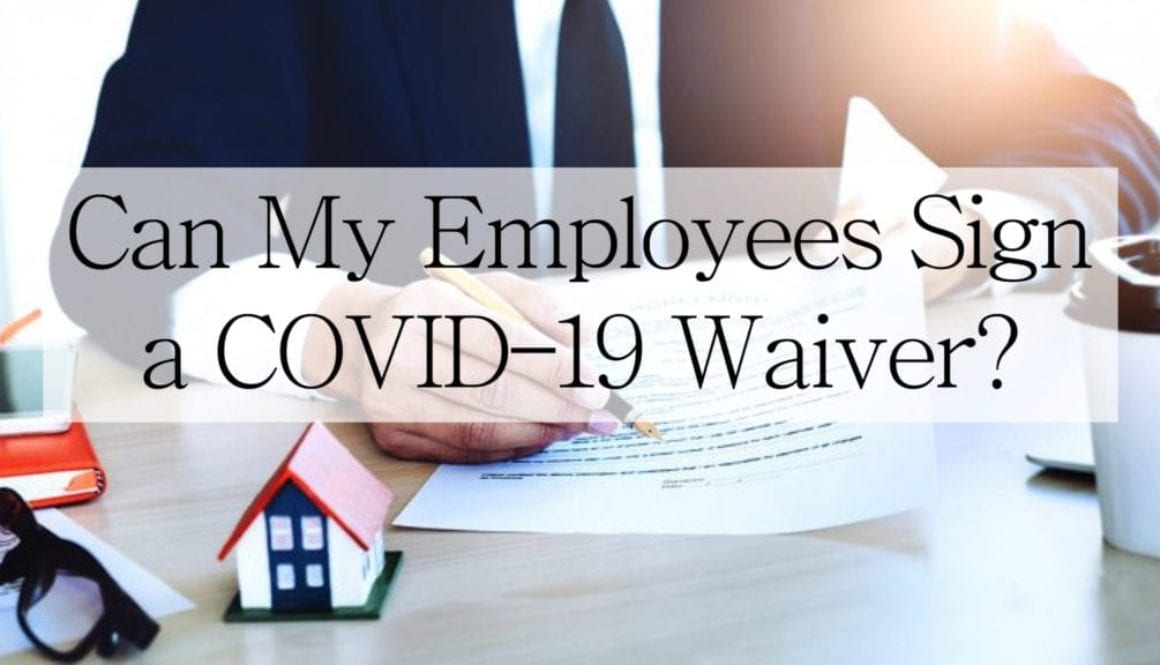Can My Employees Sign A COVID-19 Waiver?
As we have all learned, businesses are opening up again, and we know that you are doing your best to keep company doors open while keeping employees and customers healthy.
Some businesses may be wondering if there is a COVID-19 waiver or acknowledgement that employees can sign before returning to the workplace which reduces or eliminates your liability as an employer.
What is a Waiver or Release of Liability?
In simplest terms, a waiver is a document in which an individual “waives” or renounces certain rights or claims. In this instance, a COVID-19 waiver would require an employee to release their employer of any liability arising from a claim which suggests that they may have contracted COVID-19 or a related illness in the workplace. By signing such a document, the goal is for employees to indemnify and hold harmless their employer for any liability in connection with their contracting the virus while at work. This waiver would have the employee take on the assumption of risk and, as such, agree to not sue or seek out compensation from their employer for damages.
Ramifications for Such a Waiver
Requiring employees to sign a COVID-19 waiver is problematic for a few reasons. First, the Workers’ Compensation system is typically the only way employees can recover damages for injuries and illnesses contracted while in the workplace. Employers are not permitted to have employees waive their rights to file claims in these instances. Furthermore, while it may be difficult to prove that the employee contracted COVID-19 while in the workplace, many states, including California, have enacted laws stating that aside from certain proof that the illness was contracted elsewhere, an employee is presumed to have contracted the virus during the course of their work and will most likely be eligible for a Workers’ Compensation claim.
Additionally, by having employees sign a waiver, employers may be viewed as attempting to circumvent or avoid their statutory obligation to follow the Occupational Safety and Health Act (OSHA) and provide employees with “employment and a place of employment, which are free from recognized hazards that are causing or are likely to cause death or serious physical harm.” Having employees sign a COVID-19 waiver is essentially requiring the employee assume the risk of an unsafe workplace, violating the above obligation for employers.
The waiver also does not protect employers from having to implement increased precautions regarding employee health and safety. Employers will still have to make a good-faith effort to show they have procedures and policies in place to mitigate risk, in accordance with the regulations and guidance released in their jurisdiction. If they do not, they open themselves up to an OSHA investigation.
Finally, even if these waivers become enforceable, having employees sign a COVID-19 waiver can significantly affect employee morale, as well as your company’s reputation. Employees who are already hesitant about returning to the workplace will become more so, likely concerned that their employer isn’t doing their part to protect them, or, at the very least, isn’t confident in their plan to minimize risk.
Alternative to a Waiver
So, what can employers do to reduce liability and keep employees safe?
The first thing you should do is comply with CDC and OSHA regulations, as well as state and local guidance. Ensure you have social distancing policies and enhanced cleaning protocols in place. Do not allow employees or visitors into your building should they have symptoms, have been in contact with someone with symptoms, or have tested positive for COVID-19. Clearly communicate these policies to employees before they return to the workplace.
Make sure employees understand the role they play in keeping their workplace safe. It’s a joint effort between employers implementing policies and employees following those policies.
Employers can also have employees sign an acknowledgement stating they have received, read and agree to adhere to the company’s policies and practices for mitigating the spread of COVID-19. This acknowledgement can include language stating that employees will be disciplined for not adhering to the workplace policies, while considering any disabilities or accommodations necessary. It can also have employees acknowledge that there is a risk, but that the employer values their safety and has implemented these policies to protect the employee. These strategies will show that the employer took action in good faith to reduce the possibility of employees contracting the virus while at work.
In Summary
As the economy begins to open up again, there is an increased risk of introducing COVID-19 into the workplace, even when an employer takes all the proper precautions. With that said, we at People Person do not believe that a COVID-19 waiver is an effective way of releasing employer liability. Not only is it highly unlikely that the document would be enforceable, but it can also have other unintended legal consequences.
As such, we recommend that businesses follow the guidelines and do everything they can to provide a safe workplace for their employees. As always, we are here to help you get there.
